‘Nandini vrat’, ‘Vasu Baras’ or ‘Govatsa Dwadashi’ are the various names through which the first day of Deepavali gets started. On Govatsa Dwadashi people worship the divine Kamadhenu or cows. In India cows are considered to be a living form of god. The Govatsa Dwadashi is observed on the 12th day of Krishna Paksha in the Ashwin month of the Hindu calendar. The Govatsa Dwadashi falls one day prior to the Dhanteras.
Why Kamadhenu is worshiped during Govatsa Dwadashi?
It is stated in the “Bhavishya Purana” that the five wish-fulfilling cows had emerged, among them was a divine cow Nanda. The cow with its calf was worshipped as holy mothers because they provide nourishment to mankind. On Govatsa Dwadashi married women keep fast for the long life of their children. It is also believed that couples without a child will be blessed with a child if they perform the pooja with atmost dedication and keep a fast.
Rituals of Govatsa Dwadashi
- A ritualistic bath is given to the Kamadhenu and kumkum (vermillion) is applied on the forehead of the cow. The cow with its calf is decorated with bright clothes and a garland of flowers.
- The cows are offered with sprouts.
- If there is no cow available nearby, the idols of cow and calf are made with mud. These idols are decorated and performed pooja in the evening.
- Shri Krishna is also worshipped as he is an incarnation of lord Vishnu. It is believed that when Lord Krishna played flute amongst the cows and Gopis(milkmaids). Krishna grew as a cow herder and was called Govinda or Gopala which meant “friend and protector of the cows”.
- During the Govatsa Dwadashi women who fast can have a meal prepared with millets, sprouts or cocoon rice etc. Wheat, rice, milk and its products are not used during the fast.
- During the vrat the devotees must adopt brahmacharya i.e, sleep on the floor, not expect luxuries and worship God with a pure heart. Some even avoid sleeping and stay awake all night.
- The entire house is cleaned, people in rural places also apply cow dung paste on the floor which is a process of cleaning for them; and cow urine is sprinkled in the house as well as the premise. This is done because any negative energy in the house or the premise are driven away.
- The Panchagavya is prepared which includes a mixture of nine substances like – cow dung, cow urine, cow’s milk, cow ghee, jaggery, banana, tender coconut and water. This mixture is sprinkled all over the house. It is believed that it is important for internal and external purification during the worship.
Importance of Cow or Kamadhenu in day-to-day life
Kamadhenu denotes purity, sacrifice and non-erotic fertility. She is a mother who gives everything to her children but does not expect anything in return. She just imparts powerful blessings and cares for the well-being of her children.
In olden days cows were treated as a part of the family. They were looked after with atmost love, care and respect. It was believed that worshipping cows with atmost devotion and looking after them with love could get all their wishes and desires fulfilled. In many houses they fed the cows in their homes even before they had their breakfast. This was believed because cow is a sattva-predominant sacred creature on earth.
Let us look into the importance of cow in day-to-day life!
- Cows provide milk and other dairy products like – butter, ghee, cheese, buttermilk, etc are prepared using milk. These dairy products are treated as a source of ojas in Ayurveda. Ojas is the substance that provides immunity and body strength. The dairy products like milk and desi ghee are loaded with health benefits.
After mother’s milk, cow’s milk is considered as one of the most healthiest milk. The benefits of consuming grass-fed cow’s milk are –
- Easily digestible and reduces acidity
- High in Omega 3 and 6
- Is loaded with calcium, iodine, minerals etc
- Rich in Vitamin A, B2, B3
- It has an antioxidant beta-carotene to fight with health ailments. Thus, it is the best natural anti-oxidant.
In India, desi ghee is one of the most used milk products after milk. Grass-fed cow ghee comes with various health benefits. They are –
- Having pure desi ghee helps to lowers cholesterol and does not add on as a bad fat in the body.
- Consumption of grass-fed cow ghee reduces obesity and does not lead to any weight issues. Though ghee can be used as a vital element in the balanced diet for weight management i.e. loss or gain of weight.
- Cow ghee has a great healing property which helps in curing wounds, burns etc.
- Desi ghee benefits us with Vitamin A, D, E and K which helps us to improve the functioning of the parts of the body.
- It is also believed that the hump on the body of the desi cows absorb the energy from the sun rays, moon and other luminous bodies, which is further transmitted to their milk. By consuming the pure desi ghee produced from the organic grass fed desi cow can benefit us in various ways. Thus it acts as an energy promoter.
- Regular consumption of grass-fed cow ghee promotes bone strength and also helps in providing a better cure to broken bones.
- Vedic A2 ghee not only prevents heart blockage but also ensures good cardiovascular health.
- Cow ghee helps in keeping the joint lubricated and reduces joint pains.
- Regular consumption of pure desi ghee in your diet helps to rejuvenate the body.
- It also slows down the progress of cancer causing cells.
- Grass-fed cow ghee acts as moisturizer to the skin.
- It also eases constipation.
Read our blog – Why 100% grass-fed cow ghee matters?
You can buy organic grass fed desi cow Indian ghee which is also called as vedic A2 ghee at our online store. Visit the website https://sureshfoods.com/ to know more. We aim to provide the pure desi ghee to our consumers and at the same time ensure that the prosperity of ghee is not lost due to various myths.We practice ‘DHARMA’ and not KARMA’. We are not a business, rather a MISSION.
- Besides the cow’s milk, cow dung and cow urine are also used in the rural regions even today. The cow dung is saved and used as a form of fuel. Cow dung has a high content of methane and can also be used for the generation of electricity. It is also used in fields and farms as an excellent fertilizer. In homes, the mixture of cow dung is applied on the walls and floors. It is also used in the premises of the house inorder to keep the negative energies from entering into the home.
- During yagnas or Agnihotri cow dung and ghee is burned in Agni (fire). It is believed that by burning cow dung or ghee in the Agni purifies the air in the atmosphere, acts as a anti-pollutant and anti-radiant factor.
- Panchamrit is prepared using 5 items – milk, desi ghee, curd, honey and banana. The Panchamrit is offered to the God during special ceremonies and is given to the devotees after the ceremony.
Every part of the cow’s body has certain religious significances. The four legs symbolizes Vedas and its horns symbolizes the gods, its face symbolizes the sun and moon, shoulder symbolizes Agni and feeding organ symbolises Purusharthas (object of human pursuit). Govatsa Dwadashi is just a special day to worship the cows. But we must be thankful to the cows 365 days as well, we must show the same love, care and divinity everyday.
Why Govatsa Dwadashi performed before Diwali?
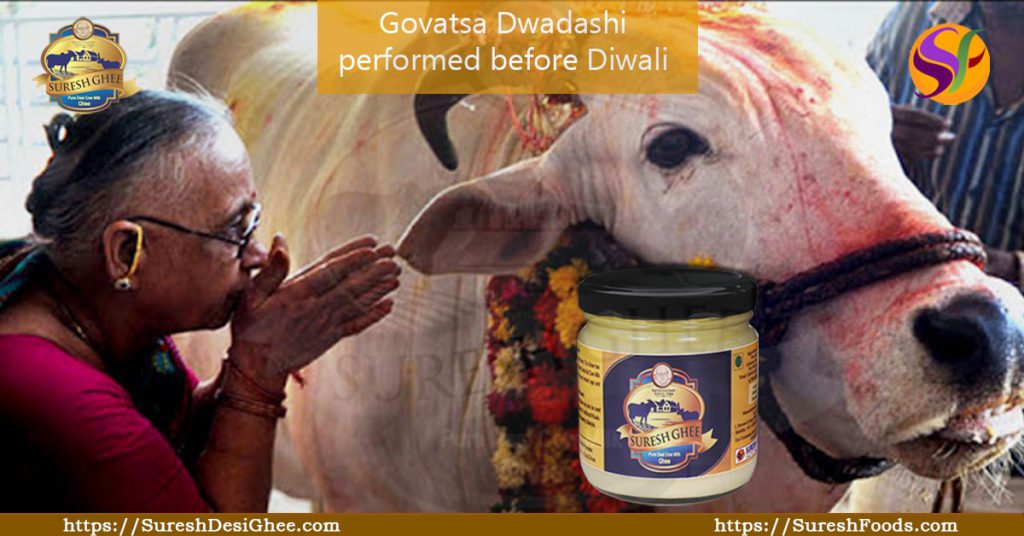
Govatsa Dwadashi is performed before Dipavali to protect the environment from the instability generated during Diwali. During Deepavali the flow of energy is activated in the environment and as a result the environment is prone to harmful energies which causes instability in the environment. Thus, to save the environment from the harmful energies Govatsa Dwadashi is celebrated. On the day of Govatsa Dwadashi through the manifest frequencies of Sri Vishnu the stability is maintained in the environment.
People in the rural regions worship cows because cows are the main source of income for the villagers. It is also believed that Goddess Lakshmi arrives in the form of a cow. Thus, worshipping the Kamadhenu a day before Diwali is to seek the blessings of god Lakshmi and Kamadhenu.
Let Kamadhenu bless you and your family with health, wealth and happiness.
Happy Govatsa Dwadashi
Happy and Prosperous Diwali from Suresh Foods!!

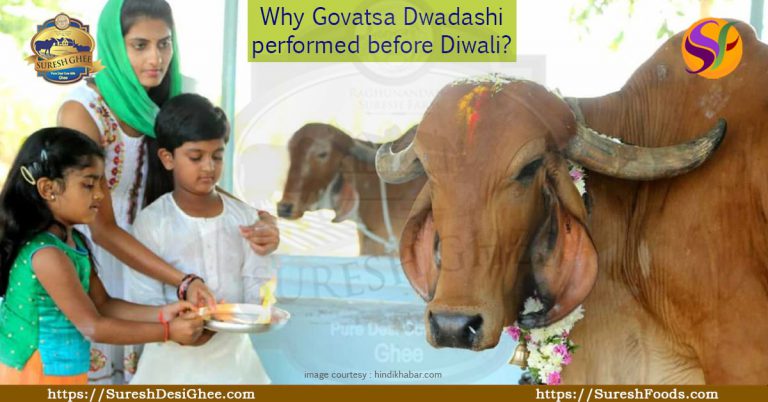


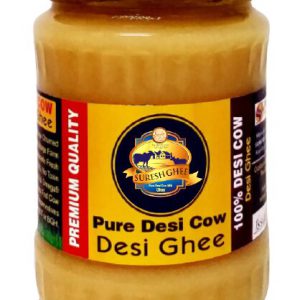
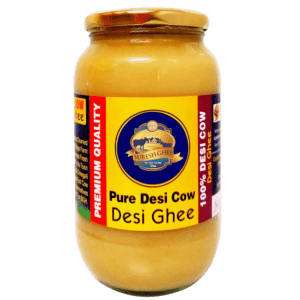
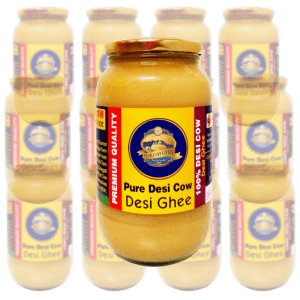
 WhatsApp us
WhatsApp us
Naveen m...